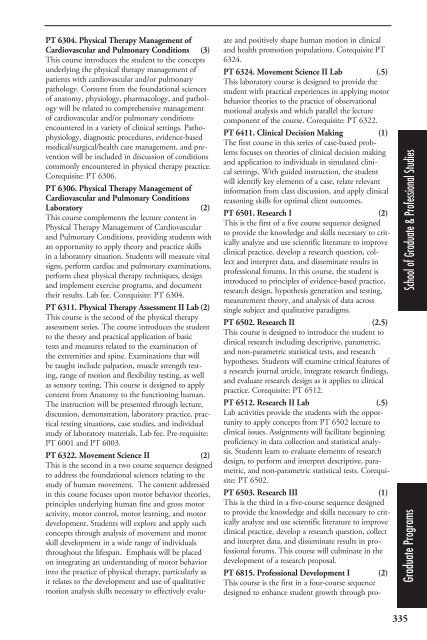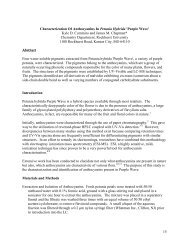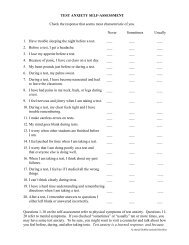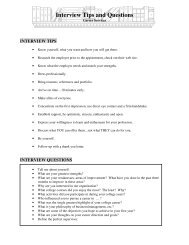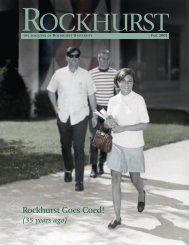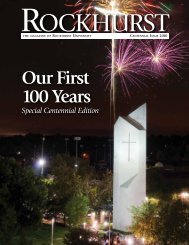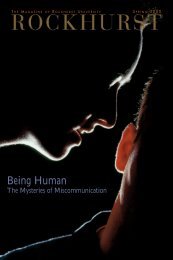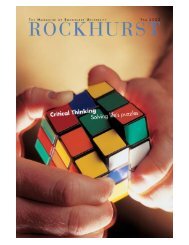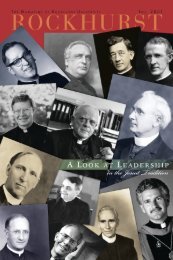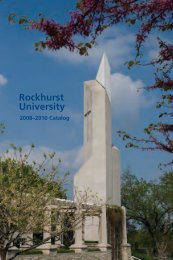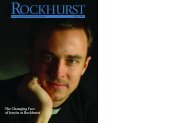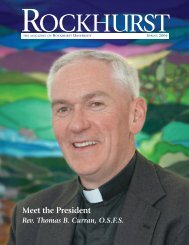RockhuRst univeRsity 2012â2014 catalog
RockhuRst univeRsity 2012â2014 catalog
RockhuRst univeRsity 2012â2014 catalog
- No tags were found...
Create successful ePaper yourself
Turn your PDF publications into a flip-book with our unique Google optimized e-Paper software.
PT 6304. Physical Therapy Management ofCardiovascular and Pulmonary Conditions (3)This course introduces the student to the conceptsunderlying the physical therapy management ofpatients with cardiovascular and/or pulmonarypathology. Content from the foundational sciencesof anatomy, physiology, pharmacology, and pathologywill be related to comprehensive managementof cardiovascular and/or pulmonary conditionsencountered in a variety of clinical settings. Pathophysiology,diagnostic procedures, evidence-basedmedical/surgical/health care management, and preventionwill be included in discussion of conditionscommonly encountered in physical therapy practice.Corequisite: PT 6306.PT 6306. Physical Therapy Management ofCardiovascular and Pulmonary ConditionsLaboratory (2)This course complements the lecture content inPhysical Therapy Management of Cardiovascularand Pulmonary Conditions, providing students withan opportunity to apply theory and practice skillsin a laboratory situation. Students will measure vitalsigns, perform cardiac and pulmonary examinations,perform chest physical therapy techniques, designand implement exercise programs, and documenttheir results. Lab fee. Corequisite: PT 6304.PT 6311. Physical Therapy Assessment II Lab (2)This course is the second of the physical therapyassessment series. The course introduces the studentto the theory and practical application of basictests and measures related to the examination ofthe extremities and spine. Examinations that willbe taught include palpation, muscle strength testing,range of motion and flexibility testing, as wellas sensory testing. This course is designed to applycontent from Anatomy to the functioning human.The instruction will be presented through lecture,discussion, demonstration, laboratory practice, practicaltesting situations, case studies, and individualstudy of laboratory materials. Lab fee. Pre-requisite:PT 6001 and PT 6003.PT 6322. Movement Science II (2)This is the second in a two course sequence designedto address the foundational sciences relating to thestudy of human movement. The content addressedin this course focuses upon motor behavior theories,principles underlying human fine and gross motoractivity, motor control, motor learning, and motordevelopment. Students will explore and apply suchconcepts through analysis of movement and motorskill development in a wide range of individualsthroughout the lifespan. Emphasis will be placedon integrating an understanding of motor behaviorinto the practice of physical therapy, particularly asit relates to the development and use of qualitativemotion analysis skills necessary to effectively evaluateand positively shape human motion in clinicaland health promotion populations. Corequisite PT6324.PT 6324. Movement Science II Lab (.5)This laboratory course is designed to provide thestudent with practical experiences in applying motorbehavior theories to the practice of observationalmotional analysis and which parallel the lecturecomponent of the course. Corequisite: PT 6322.PT 6411. Clinical Decision Making (1)The first course in this series of case-based problemsfocuses on theories of clinical decision makingand application to individuals in simulated clinicalsettings. With guided instruction, the studentwill identify key elements of a case, relate relevantinformation from class discussion, and apply clinicalreasoning skills for optimal client outcomes.PT 6501. Research I (2)This is the first of a five course sequence designedto provide the knowledge and skills necessary to criticallyanalyze and use scientific literature to improveclinical practice, develop a research question, collectand interpret data, and disseminate results inprofessional forums. In this course, the student isintroduced to principles of evidence-based practice,research design, hypothesis generation and testing,measurement theory, and analysis of data acrosssingle subject and qualitative paradigms.PT 6502. Research II (2.5)This course is designed to introduce the student toclinical research including descriptive, parametric,and non-parametric statistical tests, and researchhypotheses. Students will examine critical features ofa research journal article, integrate research findings,and evaluate research design as it applies to clinicalpractice. Corequisite: PT 6512.PT 6512. Research II Lab (.5)Lab activities provide the students with the opportunityto apply concepts from PT 6502 lecture toclinical issues. Assignments will facilitate beginningproficiency in data collection and statistical analysis.Students learn to evaluate elements of researchdesign, to perform and interpret descriptive, parametric,and non-parametric statistical tests. Corequisite:PT 6502.PT 6503. Research III (1)This is the third in a five-course sequence designedto provide the knowledge and skills necessary to criticallyanalyze and use scientific literature to improveclinical practice, develop a research question, collectand interpret data, and disseminate results in professionalforums. This course will culminate in thedevelopment of a research proposal.PT 6815. Professional Development I (2)This course is the first in a four-course sequencedesigned to enhance student growth through pro-School of Graduate & Professional StudiesGraduate Programs335


